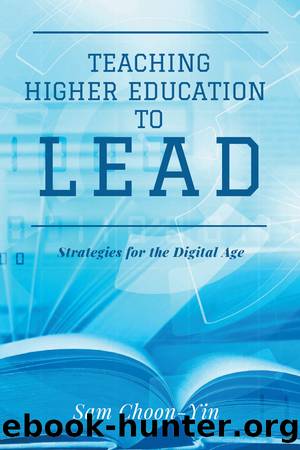Teaching Higher Education to Lead by Sam Choon-Yin

Author:Sam Choon-Yin [Choon-Yin, Sam]
Language: eng
Format: epub
Published: 2021-12-04T00:00:00+00:00
1 Sachs, âThe Price of Civilisation,â p. 166. Sachs highlighted the enticements of modern mediaâcommercial advertising, public relations campaignsâwhich have âremouldedâ our psyches to want more and more consumption. The key to achieve long-term happiness is to adopt the middle path. Sachs told us, âThe essential teaching of both Buddha and Aristotle is that the path of moderation is the key to fulfilment but is hard won and must be pursued through lifelong diligence, training, and reflectionâ (ibid., p. 62).
2 Hirchman, âThe Passions and the Interests,â p. 16.
3 Cited from Allen, âGreek Philosophy,â p. 307.
4 Homo sapiens are the knowing man, the brainy species that acquires knowledge and uses information. Several breakthroughs such as the creation of writing, reading and now the electronic media or what Steven Pinker calls the âsupernova of knowledgeâ will continue to redefine âwhat it means to be human.â Pinker wrote; âTo be aware of oneâs country and its history of the diversity of customs and beliefs across the globe and through the ages, of the blunders and triumphs of past civilisations, of the microcosms of cells and atoms and the macrocosms of planets and galaxies, of the ethereal reality of number and logic and patternâsuch awareness truly lifts us to a higher plan of consciousness. It is a gift of belonging to a brainy species with a long history.â See Pinker, âEnlightened Now,â p. 233.
5 Furedi, âWasted,â p. 20.
6 Quoted from Blum, âI Love Learning; I Hate School,â p. 66.
7 Clark, Fleche, Layard, Powdthavee, and Ward, âThe Origins of Happiness.â
8 Kilpatrick, âFoundations of Method.â
9 Cszszentmihalyi, âFlow,â p. 4. Educators have been researching on integrating curiosity and interest as positive motivations for learning, positioning them as a model for cognitive and academic development. See Peterson and Hidi, âCuriosity and Interestâ; Alexander, âSeeking Common Ground.â
10 Carr, âUtopia Is Creepy and Other Provocations,â pp. 90â91.
11 Furedi, âWasted,â p. 11.
12 Maslow, âThe Farther Reaches of Human Nature,â p. 46.
13 Ibid., pp. 162â163.
14 Gardner, âExcellence.â
15 Some may argue that university is the place to learn and not to make money. Stefan Collini, for example, advised, âIf you want to make money, go into business. If you want to learn how to make money, go to business school. If you want to learn what money is and how it has functioned and what might be the point of making a lot of money, go to university.â See Collini, âSpeaking of Universities,â p. 79. Mixing the two objectivesâmaking money and learning what money isâgives rise to the paradox of real learning. To gain employment in the job market, students opt for easy pass subjects and pick lecturers who are lenient in marking and left the university with the feeling that they have not been educated.
16 Neil Postman has argued that the current crisis in education system is derived from the lack of a unifying narratives like those in the past as found in texts such as the Old Testament, the New Testament, and Koran and the Bhagavad Gita. The narratives, incorporating the
Download
This site does not store any files on its server. We only index and link to content provided by other sites. Please contact the content providers to delete copyright contents if any and email us, we'll remove relevant links or contents immediately.
Zero to IPO: Over $1 Trillion of Actionable Advice from the World's Most Successful Entrepreneurs by Frederic Kerrest(4574)
Machine Learning at Scale with H2O by Gregory Keys | David Whiting(4313)
Never by Ken Follett(3957)
Harry Potter and the Goblet Of Fire by J.K. Rowling(3859)
Ogilvy on Advertising by David Ogilvy(3622)
Shadow of Night by Deborah Harkness(3368)
The Man Who Died Twice by Richard Osman(3080)
Book of Life by Deborah Harkness(2939)
The Tipping Point by Malcolm Gladwell(2925)
Will by Will Smith(2920)
Purple Hibiscus by Chimamanda Ngozi Adichie(2858)
0041152001443424520 .pdf by Unknown(2846)
My Brilliant Friend by Elena Ferrante(2831)
How Proust Can Change Your Life by Alain De Botton(2814)
How to Pay Zero Taxes, 2018 by Jeff A. Schnepper(2655)
Hooked: A Dark, Contemporary Romance (Never After Series) by Emily McIntire(2555)
Rationality by Steven Pinker(2366)
Can't Hurt Me: Master Your Mind and Defy the Odds - Clean Edition by David Goggins(2342)
Borders by unknow(2315)
